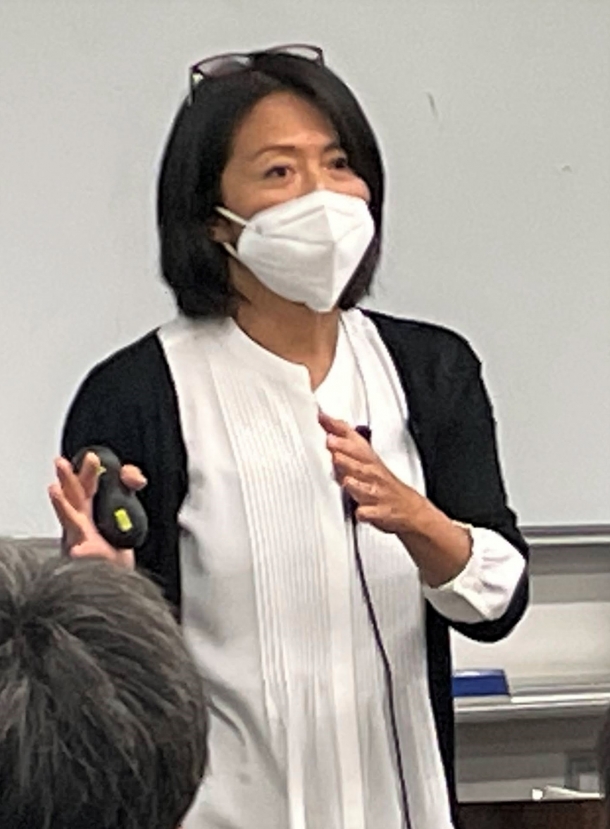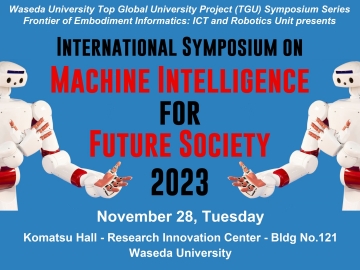
Professor Jeanne Tsai
On November 14, 2022, the Center for Positive/Empirical Analysis of Political Economy welcomed Professor Jeanne Tsai of Stanford University and held a special seminar titled “How Culture Influences Our Emotions (and Why It Matters).”
At the beginning, Professor Yuri Miyamoto of Hitotsubashi University, a social psychologist and a former professor at the University of Wisconsin, talked about what social and cultural psychology are, and how cultural differences affect people’s behavior. Professor Miyamoto then introduced Professor Tsai, a world-class social psychologist at Stanford University, explaining how Professor Tsai’s research has contributed to those fields of studies.
In the lecture, Professor Tsai introduced various research results on the cultural differences between Asian and Western countries in people’s emotions. Professor Tsai, who has made distinguished contributions to the research on how cultural differences affect people’s behavior, was so inspiring that participants actively asked questions about the difference in behavioral patterns between Japan and the United States regarding wearing masks, as well as cultural differences between Europe, the United States and regions other than Asia.
For students who deal with political and economic behavior, research in social psychology and the knowledge gained from it are valuable. The lecture given by Professor Tsai brought them a great educational opportunity that would lead to an understanding of behavioral economics.

Professor Yuri Miyamoto


Student report by Mahiro MISONO
3rd year, School of Political Science and Economics (SPSE)
I have heard that, due to national traits, many Japanese tend to be reserved rather than assertive, while Americans, on the other hand, actively express their opinions. My impression was, it was just a rule of thumb and was only a rumor.
Professor Tsai clarified in her lecture that the reason why such a difference is born is that the ideal state of feeling is different depending on one’s cultural background. Professor Tsai used a lot of data showing that the cultural difference influences the ideal feeling. I found that very interesting.
When asked what their ideal state would be, both European Americans and people from Hong Kong wanted “positive” in terms of “valence.” In terms of “arousal,” however, while European Americans valued “high arousal” such as “excitement” and “enthusiasm,” Hong Kong people placed more emphasis on “low arousal,” such as “quiet” and “calm.”
In fact, as for people’s facial expressions in magazines and posters of politicians, bright facial expressions and clear smiles are preferred in the United States, whereas calm facial expressions are preferred in Hong Kong and Taiwan. In the United States, people who “influence” someone are considered ‘better’ in various situations, while in Asian countries such as Hong Kong, it is considered better to “adjust” to others.
It was a very inspiring lecture where various examples of experiments were involved to proof the relationship between ideal emotions/personality and cultural backgrounds.

(From right) Professor Jeanne Tsai, Professor Yuri Miyamoto and Professor Yoshikuni Ono

(From right) Professor Jeanne Tsai, Professor Yoshikuni Ono and Mahiro Misono (SPSE student)
Abstract
Although most people want to feel good, people differ in the specific positive states they value and ideally want to feel (their “ideal affect”). In this talk, I will describe a series of studies using a variety of self-report, neuroimaging, and behavioral methods showing that: (1) how people want to feel differs from how they actually feel, (2) cultural factors shape how people want to feel even more than how they actually feel, and (3) these cultural differences in ideal affect predict what people choose, how they define health and well-being, and how they judge and treat other people. Finally, I will discuss the implications these findings have for understanding how culture shapes consumer preference, hiring, charitable giving, and other forms of resource sharing.
Profiles
- Professor Jeanne L. Tsai
Jeanne L. Tsai is currently Professor and Vice Chair of Psychology in the Department of Psychology at Stanford University, Director of the Stanford Culture and Emotion Lab, and the Yumi and Yasunori Kaneko Family University Fellow in Undergraduate Education. She received her B.A. in psychology from Stanford, her Ph.D. in clinical psychology from UC Berkeley, and did her post-doctoral work at UCSF in minority mental health. Her research examines the cultural shaping of emotion and its implications for health, decision-making, person perception, and resource sharing in a variety of applied settings. Her work is currently funded by the National Science Foundation, and various interdisciplinary initiatives at Stanford. Jeanne is serving her second term as associate editor of Emotion. She is fellow of the Association for Psychological Science, the American Psychological Association Division 8, the Society for Personality and Social Psychology, and the Society for Experimental Social Psychology. At Stanford, she has received the Dean’s Award for Distinguished Teaching twice, and the Asian American Activities Center Faculty Award. Her work has been described in various national news outlets including NPR, National Geographic Magazine, Psychology Today, World Economic Forum, Harvard Business Review, The Atlantic, and the Washington Post. - Professor Yuri Miyamoto
Yuri Miyamoto is a social and cultural psychologist. She received her Ph.D. at the University of Michigan. After working as a faculty member in the Psychology Department at the University of Wisconsin-Madison for more than 10 years, she is now a professor in the Graduate School of Social Sciences at Hitotsubashi University.








